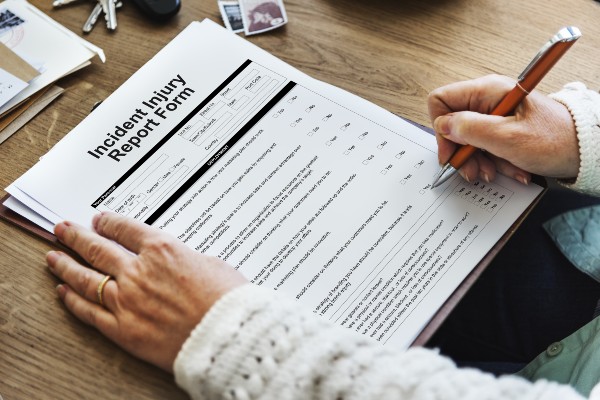
Following an accident, you may need to file a claim with your insurer or the other party’s insurance company – depending on the circumstances of the incident. Regardless, you will have paperwork to file, deadlines to meet, and a meeting (or two) with an insurance claim adjuster.
Knowing what paperwork and what claims you must file are critical. Furthermore, you must act fast. Some insurers have clauses in their policy limiting how long you have to notify them of an incident. Even if you do not plan to collect from your own insurance, you still need to notify them of an accident and the other party’s insurer. If you fail to do so, your insurance may not help financially when the other party’s insurance does not pay.
The Basic Claims After an Accident
If you were injured in an accident, you should not only file the right claim, but also file a police report. Police reports are used in insurance claims to help determine fault and could determine whether or not you get compensation.
A First Party Claim or Third-Party Claim?
You have two primary types of claims, which are the first- and third-party claims. These break down as follows:
- First-Party Claim – A first-party claim is one you file with your insurance carrier.
- Third-Party Claim – Third-party claims stem from another party’s insurance where you file the claim with them, and you are holding that person accountable for your injuries. This can be a private party or business.
What Type of Claim Do You File?
The type of claim depends on multiple factors. You will need to not only file a claim by the type of accident, but who was at fault, and what type of insurance coverage they carry. For example, if you are injured in someone’s home, you would not file a claim with their auto insurance, but you would file it with their homeowner’s or renter’s insurance policy.
If you were rear-ended by another vehicle, then you would file a claim with that at-fault party’s automobile insurance provider. If, however, you were a passenger in that vehicle, you may file it with the owner of the vehicle you were in or the at-fault party’s insurance – depending on the circumstances.
If you slipped and fell on an icy sidewalk outside of a business, then you may file that claim with their insurance company.
Getting Started – How Do You File an Insurance Claim?
Filing an insurance claim sounds straightforward, but it is a complicated process – and one you must do quickly. So, you do not have much time to stop and learn about the procedures, and most accident victims end up learning as they go, which puts them at a severe disadvantage when it comes to getting the compensation they deserve.
It doesn’t matter where you were injured or what type of injury you experienced (automobile, slip and fall, or injury in someone’s home), you must report the incident, which begins the claims process, as soon as possible. In most cases, this is 24 hours from the time of the incident.
If you were not at fault, then you will want to gather the at-fault party’s insurance information at the accident scene. That way, you can contact their insurance company and report the accident. You will need to provide details about the accident, including:
- The date and time it happened;
- Where the accident happened;
- The type of accident;
- Whether or not you went to the hospital;
- Other parties involved;
- Your contact information; and
- Any police report numbers (if you filed one).
The party taking your information over the phone may ask other details, depending on the type of claim and company you are calling. They will ask about the extent of your injuries and may even ask what you were doing up until the injury. While you may be tempted to provide a full statement, avoid doing so until you have spoken to an accident attorney.
This is the time where insurance companies take advantage of what you say, and any information you provide will be considered by the claims adjuster and used to avoid making full payment to you. You want an attorney present any time you make a statement to an insurance company, and if the claims adjuster would like an interview, let them know that your attorney will be present. Your attorney not only makes sure you do not say something that can be misconstrued as guilt, but also keeps insurance claim adjusters from asking any inappropriate questions.
Be Prepared for an Independent Medical Examination
You may have records proving you sought medical treatment, and you may even have a diagnosis about the extent of your injuries, but this will not be enough for compensation. Instead, the insurance company will request an Independent Medical Examination (IME). This doctor works for that insurance company, and they will go over your medical records, physically examine you, and may do medical tests, depending on the type of injuries you claim to have.
The Calculation and Settlement Process
After you have filed the claim and gone through the IME, the claims adjuster most likely will approach you with an offer. This offer, while they may say is the final offer, is rarely so. Usually, insurance companies like to come forward with an offer that seems reasonable, but it is still way less than you deserve. If, however, you already have an attorney involved, the insurance company is more likely to come up with an offer closer to what you deserve, because you have someone on your side protecting your rights.
Hire an Accident Attorney to Help Navigate the Claims Process
Filing an insurance claim is incredibly stressful, and that stress is not something you need when you are trying to recover from an accident. To avoid dealing with the stress of filing a claim, filling out paperwork, or negotiating with insurance companies, contact an accident attorney. Attorneys are your advocates, they help protect your rights, and they take the load off your shoulders by handling the paperwork, negotiations, and filings.
To explore your options for compensation after an accident, and to get assistance with an insurance claim, contact the team at Brett McCandlis Brown & Conner, PLLC, today. We offer no-obligation case evaluations, so call us today to get started.


